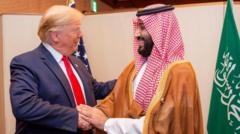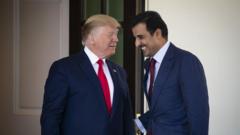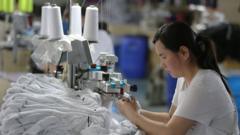The President aims to secure investment commitments that align with his "America First" policy while reinforcing ties with Gulf nations as they seek to diversify their economies away from oil.
Trump Seeks Major Gulf Investments During Upcoming Middle Eastern Tour

Trump Seeks Major Gulf Investments During Upcoming Middle Eastern Tour
Amid economic challenges, President Trump targets substantial Gulf investments to boost the US economy in his forthcoming visit to Saudi Arabia, Qatar, and the UAE.
President Donald Trump is scheduled to embark on a crucial trip to Gulf nations this week, with a strong emphasis on attracting new investments from the region to bolster the US economy. Trump's upcoming meetings, especially with Saudi Crown Prince Mohammed bin Salman in Riyadh, are seen as pivotal in securing these financial commitments.
Economist Karen Young from the Middle East Institute notes, “President Trump wants to showcase a significant increase in Gulf investment during this visit, ideally with a clear illustration of how these funds will impact job creation and support domestic manufacturing.” With economic indicators such as a decrease in US output and disrupted trade due to new tariffs, the urgency to present a favorable economic narrative is evident.
Trump is set to arrive in Riyadh on May 13 and will then participate in a summit of Gulf leaders the following day, concluding his trip in Qatar and the UAE. This visit mirrors Trump's first-term journey where Saudi Arabia was his inaugural destination, breaking the norm of US presidents starting their terms with visits to traditional allies like Canada or the UK.
This trip is significant not only for its economic implications but also as a means to reinforce geopolitical alliances amidst shifting relationships under subsequent administrations. The planned Saudi-US investment forum will host top executives from Wall Street and Silicon Valley, featuring leaders from firms like IBM and Qualcomm.
Saudi Arabia’s plan to invest $600 billion in the US has been previously outlined, but Trump is seeking to elevate that figure to $1 trillion, potentially including military purchases. According to Ali Shihabi, a commentator closely connected to the Saudi government, new economic agreements aligning with the visit are anticipated, including significant arms deals.
In an effort to facilitate these investments, the Saudi Public Investment Fund, which manages assets exceeding $925 billion, continues to hold stakes in several US companies, while the UAE's proposed commitment of $1.4 trillion over the next decade underscores the Gulf states' shift towards technology and sustainable sectors.
While some experts express skepticism about reaching such ambitious investment figures quickly, the potential deals are poised to further integrate the US and Saudi economies. Anti-terrorism cooperation and military procurement issues are also expected to be addressed, particularly as the Biden administration starts to ease restrictions on arms sales to Riyadh.
Of particular interest is the modernization of the procurement system, which could enable Saudi Arabia to access critical military resources more efficiently. Additionally, discussions on artificial intelligence and technology investments reflect the region’s desire to reduce reliance on oil revenues.
Ultimately, Trump's visit aims to be mutually beneficial — for the US, it represents a chance to stabilize economic relations; for the Gulf states, it's a step towards advancing their Vision 2030 initiative, which emphasizes economic diversification.
As Trump engages with Gulf leaders, attention will be on the deals that may emerge to rejuvenate his economic narrative back home while strengthening longstanding alliances in the Middle East.



















